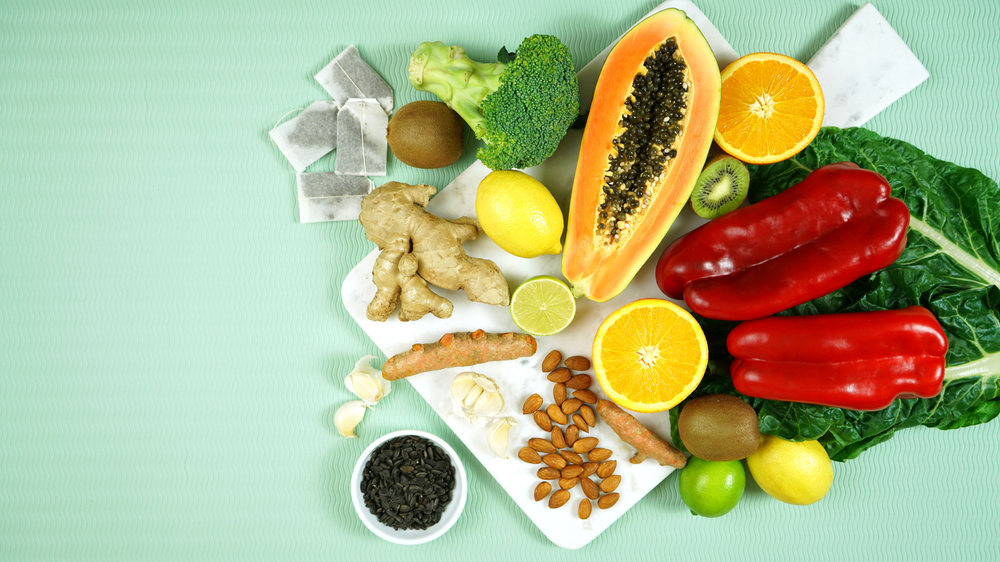Every day, your immune system is hard at work, fighting off illness-inducing germs and microorganisms. If your immune system isn’t at it’s best, it can lose the battle and allow germs to make you sick. More than ever before, it’s important that your immune system is performing at its peak. By knowing the signs to look for, you can recognize when your immune system is lagging. Even better, you can take daily action to support your immune system with the proper foods and vitamins.
Signs of A Weakened Immune System
As your immune system begins to lag, it shows its distress in several ways. Tune in to your body and consider the following questions. If you answer yes to any of them, your immune system may not be functioning fully.
Do you have cold symptoms often? – Everyone catches the common cold from time to time. In fact, most adults will have up to three colds each year. Typically, symptoms, such as sneezing, a stuffy nose and watery eyes, will last a maximum of two weeks. If your symptoms last longer, just won’t go away or recur more often, it may be a sign that your immune system isn’t working well.
Do you have frequent infections? – Like colds, infections that pop up frequently may be a warning sign that your immune system is not at its best. Consider how often you experience ear infections, sinus infections, urinary tract infections, strep throat or yeast infections. If you have more than two infections each year, which require treatment or antibiotics, your immune system may not be able to keep up with the demands placed on it.
Do you experience frequent diarrhea? – Over half of your immune system is located within your digestive tract. Beneficial bacteria lives in the gut, where it fights off germs that come into the body with food and drinks. If you find yourself running for the toilet often, the amount of beneficial bacteria in your digestive tract may be too low.
Are cuts and scrapes slow to heal? – A healthy immune system responds to minor injuries by delivering immune cells to the site through the bloodstream. When your immune system is lagging, there simply aren’t enough cells to send. This lack leaves the injury open to infection and prevents speedy healing.
Do you feel tired all the time? – When you don’t get enough quality rest, your immune system will likely become the victim. Sleep allows immune cells to regenerate and recharge. If you frequently feel exhausted, your immune system is likely crying out for help.
Vitamins Fuel the Immune System
To successfully build and support your immune system, you’ll need the right intake of specific vitamins. A healthy diet should include daily doses of these nutrients. However, if dietary restrictions, food aversions or other factors prevent you from getting enough of these vitamins, a supplement may be necessary.
Vitamin C – Vitamin C, which aids in the production of white blood cells, is a powerhouse when it comes to combating colds and infections. Unfortunately, getting enough vitamin C is an ongoing concern, since the body can not store this nutrient over time. In general, women require 75 milligrams while men need 90 milligrams of vitamin C each day.
Vitamin B6 – Though vitamin C gets the bulk of the attention, vitamin B6 is an overlooked powerhouse for the immune system. This nutrient’s role is both far-reaching and complex. B6 aids in the production of both white and red blood cells while also assisting in creating new antibodies. At the same time, vitamin B6 helps to move oxygen through the bloodstream and aids in regulating immune responses.
Vitamin E – As an antioxidant, vitamin E helps in the fight against infections. Plus, vitamin E acts to speed wound healing by widening the blood vessels so that immune cells can easily travel to where they are needed most.
Supporting Your Immune System Through Diet
The cliché that you are what you eat is true when it comes to building up your immune system. Eating a diet filled with nutrient-rich foods, containing the right vitamins and minerals can help keep your immune system in fighting shape. To strengthen your immune responses, focus on these foods.
Citrus fruits – At the first sneeze or sniffle, most people reach for a glass of orange juice. This is a good instinct since citrus is full of vitamin C, a critical nutrient in keeping away cold and infections.
Green Vegetables – Though they probably don’t make many people’s list of favorite foods, green vegetables such as broccoli and spinach contain large amounts of vitamins A, C and E, as well as antioxidants. While the nutrients are at their peak amounts in raw vegetables, slightly steaming greens allows better absorption of vitamins.
Garlic – Garlic can keep away vampires, colds and infections, thanks to the antibacterial allicin. This tasty addition to your immune-boosting diet also acts as an antifungal and is thought to be especially helpful against bronchitis, earaches and colds.
Ginger – Gingerol, which is found in raw ginger root, is an anti-inflammatory and antioxidant. In addition to providing long-term immune support, ginger offers immediate relief for upset stomach and can reduce cold symptoms.
Yogurt – Remember how over half of the immune system lives in the digestive tract? Yogurt brings active cultures directly to where they are needed most. By stimulating the gut’s immune response, yogurt is key to a healthy immune system. But be careful, many yogurts are full of sugar, which can cancel out the positive impacts.
Chicken – Like orange juice, chicken soup is a go-to favorite for soothing the sick. It’s not just because soup is easy to slurp and won’t upset the stomach; poultry actually contains vitamin B6. Plus, eating chicken aids in the production of red blood cells.
Shellfish – When you are ill, a plate of shrimp or a lobster tail may not hit the spot. But shellfish contains large amounts of zinc, which is essential to overall immune function. Zinc, when consumed over time, can shorten the duration of colds and supports wound healing.
Other Actions to Support the Immune System
Aside from proper nutrition and getting the right amounts of key nutrients, there are several lifestyle changes you can make to amp up your immune system.
Drink water – Proper hydration is vital to every bodily function, and to the immune response in particular. The intake of water helps to remove germs, unhealthy bacteria and pathogens from the digestive tract. In addition, staying hydrated may prevent invading germs from entering the body through the eyes, mouth and nose.
Exercise – Though you shouldn’t exercise while you are ill, daily physical activity while well is an important part of keeping your immune system healthy. Not only does exercise have an anti-inflammatory effect, but it also helps to increase blood circulation and move immune cells through the body.
Sleep – The immune system does much of its work while you sleep. Sleep allows the body to fight off infections and encourages the building of immune cells. Generally, adults should aim for seven to nine hours of sleep each day. However, while ill, you may need extra sleep so that immune cells have the energy required to do their work.
Your immune system is continually doing battle against germs, bacteria and other pathogens. By caring for and supporting your immune system, you can help your body fight off illness. Just a few simple changes in diet and lifestyle can have a significant impact on your health, now and in the future.



